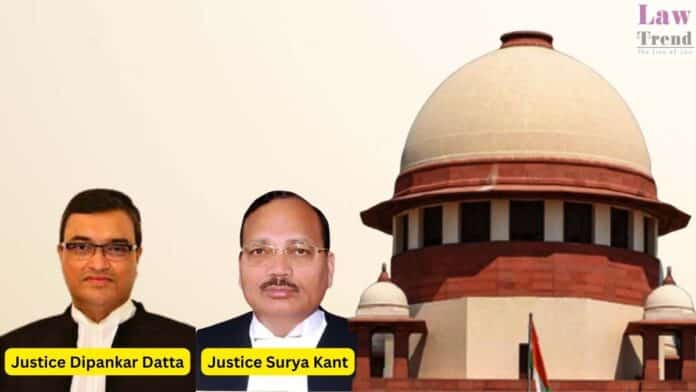The Supreme Court has permitted the grandson of former railways minister L N Mishra, who was killed in a blast at Bihar’s Samastipur Railway Station over 48 years ago, to assist the Delhi High Court in final hearing of appeals of convicts in the murder case.
Vaibhav Mishra, the grandson of the deceased leader who is also a lawyer, moved the top court challenging the February 7 order of the Delhi High Court dismissing his plea for a direction to the CBI to conduct “fair investigation” and “re-investigation”.
Alleging that the probe was botched up, Mishra sought a re-probe on grounds, including that the real culprits were discharged leading to “travesty of justice”.
The veteran Congress leader and senior cabinet minister had received fatal injuries in grenade blasts at Samastipur where he had gone for inauguration of Broad Gauge Line on January 2, 1975.
He was shifted for treatment from Samastipur to Danapur where he succumbed to injuries in the morning of January 3, 1975. Apart from Mishra, then MLC Surya Narayan Jha and Ram Kishore Prasad Singh, a railway clerk, had also died in the blasts.
A bench comprising Justices Surya Kant and Dipankar Datta took note of the submissions of Mishra and refused to entertain the plea for re-probe into the case. It, however, allowed him to assist the Delhi High Court.
“After arguing the case for some time, learned counsel for the petitioner seeks and is permitted to withdraw this petition with liberty to assist the division bench of Delhi High Court at the time of final hearing of the criminal appeals filed by the convicts, in accordance with law,” the bench said.
“The special leave petition is dismissed as withdrawn with liberty as aforesaid,” the bench said in its order passed on October 13. Earlier, the high court, on February 7, refused to grant the relief sought.
“Considering the nature of the relief sought in these proceedings; considering that the incident in question dates back to 02.01.1975; and the fact that criminal appeals arising from that trial are pending before a division bench of this court, in the opinion of this court, no relief can be granted in the present petition,” the high court had said.
Mishra had filed two petitions in the high court in the case. In 2021, the first petition was filed in the high court seeking a direction to the CBI to consider his representation of November 5, 2020 for re-investigation.
The high court had allowed Mishra to give a representation to the CBI which responded to him on September 15, 2021.
“In response of your representation dated 04.11.2020 for the subject cited, it is to inform that the representation has been examined and after examination of the representation it has found that the appeal is pending before the Hon’ble Delhi High Court against the order of conviction in the instant case. Therefore, it is not legally permissible to conduct reinvestigation in the matter,” the probe agency said.
Mishra filed a separate petition in 2023 seeking further or re-investigation in the case which was disposed of on February 7. It has been alleged that the probe in the case was botched up.
“The petitioner (Mishra) herein got concrete information/evidence of a botch-up in the investigation by respondent No.1 (CBI) in the assassination of the petitioner’s grandfather case after getting access of the trial court records which show that certain people namely Arun Kumar Mishra and Arun Kumar Thakur were arrested initially in the case on February 8, 1975 and their confessions dated February 21, 1975 were recorded before the magistrate under section 164 CrPC in criminal case …in Samastipur. This showed that the culpability of the present accused is in question,” the plea filed in SC said.
Initially the arrested people are “someone else and the accused shown later are someone else”, the plea submitted.
Three ‘Ananda Margis’ and an advocate were sentenced to life imprisonment in December 2014 by a trial court here for the killing of the former railway minister.
The trial court had held that the terror act was aimed at pressuring the then Indira Gandhi government to release the group’s jailed chief.
The convicts had filed an appeal before the high court in 2015 challenging the trial court’s verdict convicting and sentencing them and they were granted bail. The appeal is still pending in the high court.
The trial court had held three ‘Ananda Margis’ — Santoshanand, Sudevanand and Gopalji — and advocate Ranjan Dwivedi guilty of murdering Mishra and two others and had also directed the Bihar government to pay Rs 5 lakh each to the legal heirs of Mishra and two other victims who had died in the blast on January 2, 1975, just few months before the proclamation of Emergency.
Also Read
It had also asked the state government to pay a compensation of Rs 1.5 lakh each to the family members of seven people who had sustained grievous injuries and Rs 50,000 each to the kin of 20 others who had suffered simple injuries in the incident.
The court had held that the conspiracy to eliminate the targets was hatched in a meeting in 1973 at a village in Bihar’s Bhagalpur district, attended by six ‘Ananda Margis’.
The four convicts, who were out on bail during the trial and were taken into custody after conviction, were later granted bail by the high court.
Apart from them, accused Ram Nagina Prasad and Ram Rup were discharged by the court in January 1981 and Arteshanand Avadhoot died in 2004 during the pendency of the case.
Two others, Visheshwaranand and Vikram, were granted pardon after they turned approvers.
The case was transferred from Bihar to Delhi on the directions of the Supreme Court.




